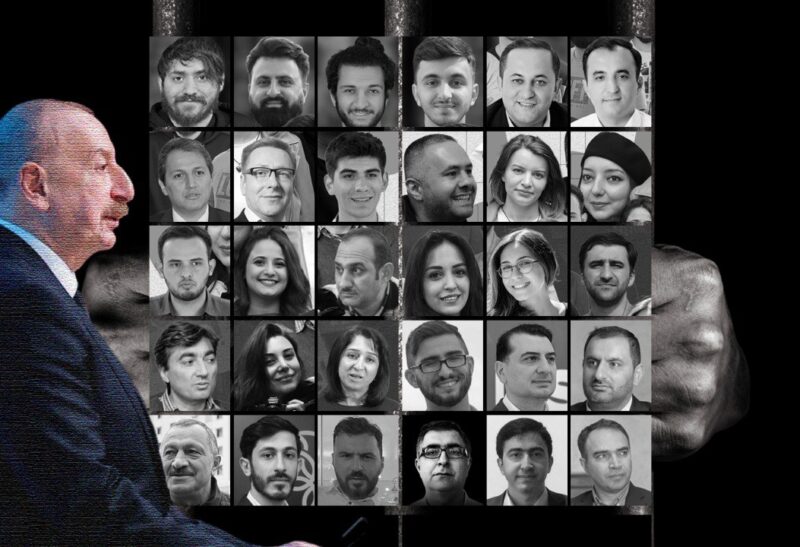
Azerbaijani activists request that the Venice Commission of the Council of Europe provide an assessment of problematic changes to the Constitution of Azerbaijan, which will be voted on in a September 26 referendum
Five well-known Azerbaijani activists and human rights defenders, including Intiqam Aliyev, Rasul Jafarov, Anar Mammadli and Leyla Yunus, went to the General Secretary of the Council of Europe, Thorbjørn Jagland, with a request for the European Commission for Democracy.
They requested that the European Council’s European Commission for Democracy through Law (The Venice Commission) perform an assessment of potential changes that may be made to the Constitution of Azerbaijan depending on the result of the national referendum on September 26.
Opposition parties brought forth critiques of the proposed changes, saying they are antidemocratic and are aimed at ensuring unbroken power for the family of acting president Ilham Aliyev. In particular, proposed changes would increase the presidential term of office from five to seven years, and would empower the president to appoint the First Vice President and Vice President, as well as to dissolve parliament. Proposed changes would also remove minimum age requirements for presidential candidates (the current minimum is 35 years), and reduce, from 25 to 18 years, the minimum age for candidates to the post of deputy in the lower chamber of parliament. Ilham Aliyev’s son Heydar is currently 19 years old.
HUMAN RIGHTS VIOLATIONS
The human rights advocates who
appealed to the Council of Europe have spent time in prison on presumably fabricated charges as retaliation for their activist work, and later were released and pardoned. Emin Gusenov, another human rights advocate and chairman of the Institute for Reporters’ Freedom and Safety, was forced to leave the country in 2015, after he was stripped of his Azerbaijani citizenship.
In their appeal, the human rights advocates claimed that “several of the proposed changes run contrary to such fundamental principles of the Council of Europe as democracy, human rights, and rule of law”. Implementing these changes will allow for the destruction of the balance of power between different branches of government, and will strengthen the “undemocratic system” in which power is concentrated in the hands of the president.
The human rights activists are also drawing attention to the fact that the Azerbaijani government has not informed the population of the reasons for these changes, nor of their potential consequences. They wrote, “The current regime’s intolerance of criticism and continued restrictions on the press and on freedom of speech and of association… make it impossible to perform a balanced assessment of the proposed changes, and explain these changes to voters, before the referendum takes place”.
However, it is as of yet unclear whether the activists’ appeal will be accepted by the Council of Europe. The Azerbaijani news agency Turan, referencing an anonymous representative of the Venice Commission, reported that the commission can provide such an assessment only at the request of the national government.
Opposition parties also brought forth criticisms of the government’s tactics for ensuring that the changes are adopted. They point to the fact that they were not put forth for broad, public discussion before President Ilham Aliyev had already send them to the Constitutional Court, which approved them after only two hours’ discussion. In a September 5 announcement, the opposition party Musavat wrote that the government had not made any efforts to explain the proposed changes to the public. According to Musavat, these changes will lead to a monarchical form of government. The popular front, Classical Azerbaijan, called for a boycott to the referendum.
REPRESSION OF CRITICISM
At the same time, the Central Election Commission of Azerbaijan refused to register an activist group created by the Musavat party with the purpose of implementing a campaign against the adoption of these changes. The stated reason for the refusal was that more than more than 3500 of the over 40,000 signatures gathered by the party in support of the group’s registration were declared invalid.
An analogous group, created by the Republican Initiative (RI) movement, announced on August 23 that it would cease lobbying against the proposed changes in connection with the arrests of the group’s leader, Natiq Jafarli, and two other activists. The police also confiscated about 100,000 brochures from this group.
The Central Election Commission registered no less than three analogous, presumably pro-government groups, which will lobby in support of adopting the changes. More than 37,000 volunteers have been called on to monitor the September 26 referendum, and more than 800 people for monitoring the commission’s work on that day.
The functioning of the press, which might shed a critical light on the proposed constitutional changes, became even further restricted after September 6, when publication of the independent newspaper
Azadlıq
was discontinued. The newspaper was shut down for debts to the government printing house, which came about as a result of withholdings in the amount of around 42,000 dollars by the government agent responsible for distributing and selling paper. Established in 1989, the
Azadlıq
newspaper is closely tied to the opposition party Azerbaijani Popular Front.
The first deputy senior editor of Azadlıq, Rahim Hajiev, stated that the leader of Azerbaijan is “unflinching” in his attempts to close the only remaining independent press outlet. In June, the independent television channel ANS TV was stripped of its license for supposedly expressing support for the US-based Turkish spiritual leader Fethullah Gülen at the time of the unsuccessful, attempted government coup in Turkey.
***
This article was originally published in Russian on
Radio Azadliq.



